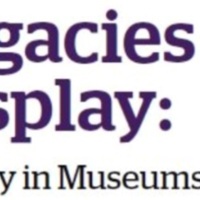1 result
Legacies on Display: Slavery in Museums
Museums are exciting places to see the usable past in action. They bring together objects, people and places to provide interpretation and facilitate discussions on a range of topics, from history to human rights. There is a global tradition of museums representing slavery beginning in the early twentieth century. These museums range from small, local community museums in the UK, that focus on individual abolitionist leaders, to redeveloped slave forts on the West African coast and large national institutions in North America. As well as providing visitors with information about slavery, both historic and modern, museums can also provide evidence as to how societies are thinking about these issues.
This collection showcases museums across the world that house permanent exhibitions relating to slavery and abolition.

Pompey Museum of Slavery and Emancipation at Vendue House
The Pompey Museum is named after a courageous enslaved man who led a slave revolt from the Rolle Plantation on Steventon, Exuma, Bahamas. Vendue House, where the museum is located, was built in the 1790s and operated as a market place where enslaved people and other goods were sold during the…